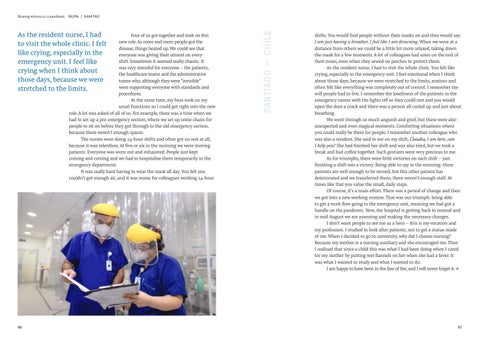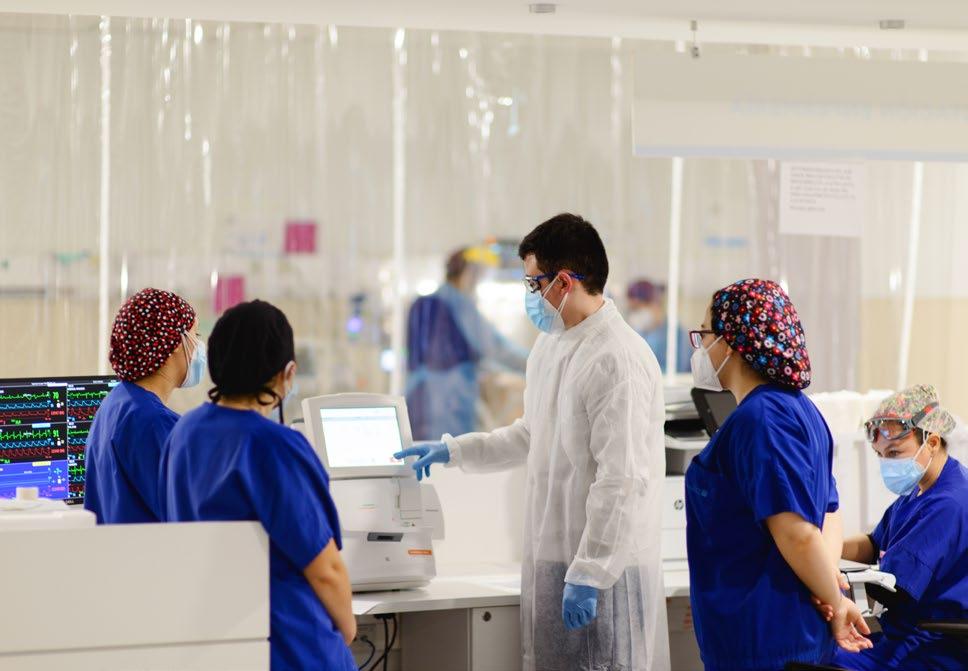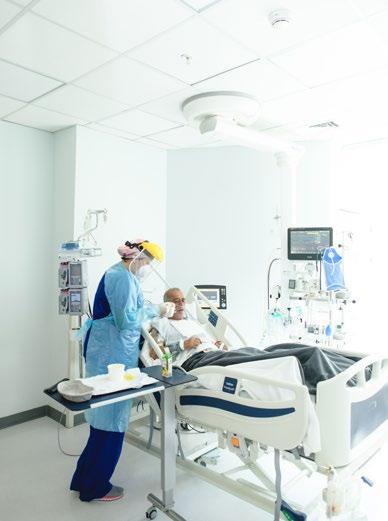As the resident nurse, I had to visit the whole clinic. I felt like crying, especially in the emergency unit. I feel like crying when I think about those days, because we were stretched to the limits.
Four of us got together and took on this new role. As more and more people got the disease, things heated up. We could see that everyone was giving their utmost on every shift. Sometimes it seemed really chaotic. It was very stressful for everyone - the patients, the healthcare teams and the administrative teams who, although they were “invisible” were supporting everyone with standards and procedures. At the same time, my boss took on my usual functions so I could get right into the new role. A lot was asked of all of us. For example, there was a time when we had to set up a pre-emergency section, where we set up some chairs for people to sit on before they got through to the old emergency section, because there weren’t enough spaces. The nurses were doing 24-hour shifts and often got no rest at all, because it was relentless. At five or six in the morning we were moving patients. Everyone was worn out and exhausted. People just kept coming and coming and we had to hospitalise them temporarily in the emergency department. It was really hard having to wear the mask all day. You felt you couldn’t get enough air, and it was worse for colleagues working 24-hour
86
SANTIAGO — CHILE
Bearing witness to a pandemic BUPA | SANITAS
shifts. You would find people without their masks on and they would say: I am just having a breather, I feel like I am drowning. When we were at a distance from others we could be a little bit more relaxed, taking down the mask for a few moments. A lot of colleagues had sores on the end of their noses, even when they sewed on patches to protect them. As the resident nurse, I had to visit the whole clinic. You felt like crying, especially in the emergency unit. I feel emotional when I think about those days, because we were stretched to the limits, anxious and often felt like everything was completely out of control. I remember the will people had to live. I remember the loneliness of the patients in the emergency rooms with the lights off so they could rest and you would open the door a crack and there was a person all curled up and just about breathing. We went through so much anguish and grief, but there were also unexpected and even magical moments. Comforting situations where you could really be there for people. I remember another colleague who was also a resident. She said to me on my shift, Claudia, I am here, can I help you? She had finished her shift and was also tired, but we took a break and had coffee together. Such gestures were very precious to me. As for triumphs, there were little victories on each shift - just finishing a shift was a victory. Being able to say in the morning: these patients are well enough to be moved, but this other patient has deteriorated and we transferred them; there weren’t enough staff. At times like that you value the small, daily steps. Of course, it’s a team effort. There was a period of change and then we got into a new working routine. That was our triumph: being able to get a work flow going in the emergency unit, meaning we had got a handle on the pandemic. Now, the hospital is getting back to normal and in mid-August we are assessing and making the necessary changes. I don’t want people to see me as a hero - this is my vocation and my profession. I studied to look after patients, not to get a statue made of me. When I decided to go to university, why did I choose nursing? Because my mother is a nursing auxiliary and she encouraged me. Then I realised that since a child this was what I had been doing when I cared for my mother by putting wet flannels on her when she had a fever. It was what I wanted to study and what I wanted to do. I am happy to have been in the line of fire, and I will never forget it. �
87






















































